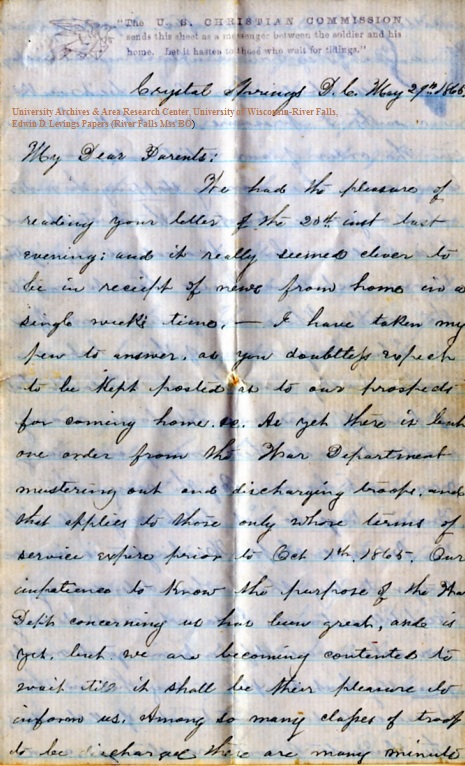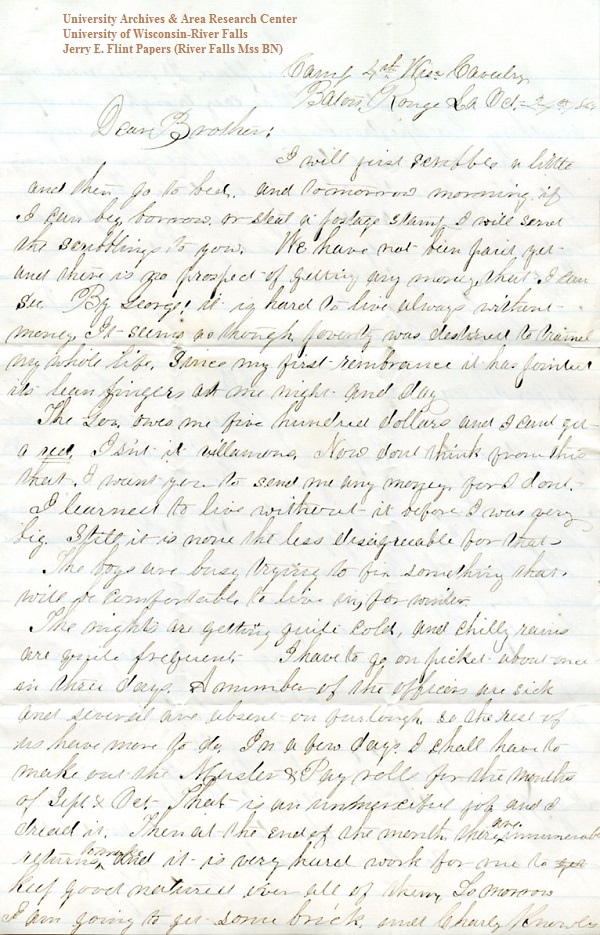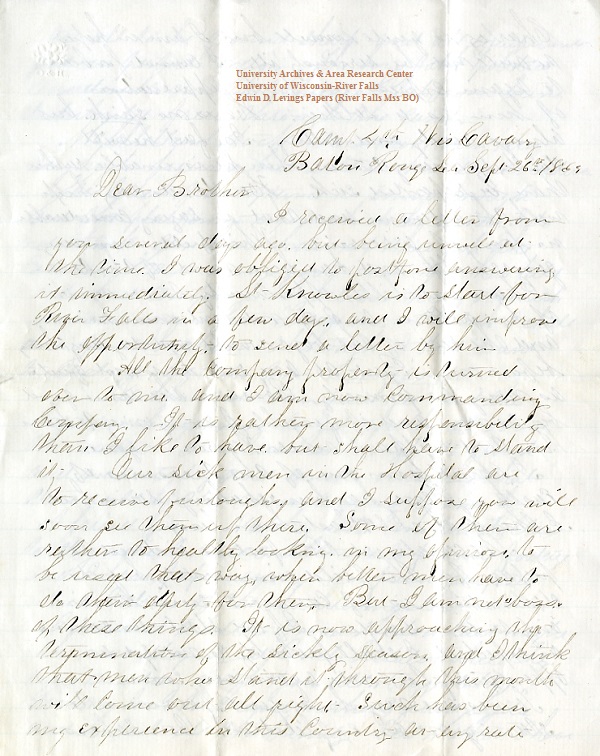The following letter comes from the February 11, 1865, issue of The Prescott Journal.
ARMY CORRESPONDENCE.
The Campaign in Virginia.
The Armies of the Potomac and the James.
SHERMAN’S NEW CAMPAIGN.
The Army of the James—From the Nineteenth Regiment.
Changes of Commanders—New Rules and Sys-
tems—Delay of paying the Troops—Desertions—
The Substitute System—Condition of the Regiment.
ARMY OF THE JAMES, }
In Front of Richmond, Jan. 18, 1865. }
This army is “watching and waiting” just outside the gates of the rebel Capital, with little to disturb its quiet, or interrupt the monotony of camp life. It had been anticipated by many, and especially by the projectors, that when the bulk-head of the Dutch Gap Canal was blown out, we would be furnished with plenty of work, and that lively times would be inaugurated hereabouts. But that which was to have opened the James to our fleet as far at least as Fort Darling, and have enabled us to flank that stronghold, has ended in the “blowing up” of sanguine expectations, and left the door to Richmond still tightly closed in that direction.
MAJOR GENERAL GIBBON.
At one time in command of the “Iron Brigade,” and more recently commander of a division in the Army of the Potomac, has just assumed command of the 24th corps of this army—Major General Ord [Edward O. C. Ord] taking the place made vacant by the removal of General Butler [Benjamin F. Butler]. With new lords come new laws, and many thorough and radical changes are already taking place and being ordered. This morning the corps was reviewed in front of our works by Gen. Gibbon [John Gibbon], and there is a general “brushing up,” evidently preparatory to the early opening of a new campaign, and the “negotiations for peace.”
THE REMOVAL OF MAJOR GENERAL BUTLER
has produced a profound sensation throughout this army, although it might have been anticipated, and really ought not to be a matter of surprise. The failure at Wilmington and the fiasco of the Dutch Gap, has sealed his fate as a field commander. With great administrative ability—keen, shrewd, sagacious, quick to discern and prompt to execute, he yet had little fitness for the command of armies, and with abundant means at his disposal could not win victories. Besides, he was unfortunate in another respect, that he transferred the iron and despotic rule which crushed out the mob at New Orleans to the camps of his soldiers, and thought to secure efficiency in discipline, and the most perfect subordination by stern and arbitrary measures and terrible punishments. Still, Gen. Butler is not dead, nor extinguished, and those who are rejoicing over his downfall and military demise, will assuredly find that his is a power in the land, and that the sun of his renown is only in partial eclipse, not set forever in darkness. He has won for himself a great name, and that name will be imperishable upon the brightest pages of our country’s history.
SUFFERING FOR WANT OF PAY.
The failure of the Government to meet its engagements with the army in the matter of pay, is not only subjecting officers and men to great inconvenience, but is a source of suffering to themselves and families. A large portion of this army has been without pay for five or six months, and hundreds of soldiers have not seen the face of a Paymaster for more than eight months. This delinquency works mischief—it discourages and demoralizes—and Government has only to persevere in it for a few months longer to break down the spirit and efficiency of the men who fight its battles. It may be good for sutlers, but it is terribly hard on those who are obliged to go upon his books for daily food.
DESERTIONS.
These are becoming alarmingly frequent in our midst. It has been said, and I have no doubt truly, that if an examination of the records of our armies in Virginia were to be made, our losses by desertion within the last six months would be reckoned not by thousands, but by tens of thousands. We inflict the death penalty upon deserters, and yet the crime is common. A regiment stationed not more than a hundred yards from where I write has been largely depleted by desertion, and none of its members can now be trusted on the picket line. The evil has its root in our system of recruiting. By it we gather up the scum and refuse and rascality, not only of our own country, but of other countries, and empty the whole villainous mass into our armies. A draft is ordered, and to save ourselves the necessity of entering the ranks and fighting in person against the rebellion, we employ substitute brokers who shall buy up convicts, rowdies, men rotten with disease, and all forms of wretched and depraved humanity, with whom to fill our places in the thinned ranks of veteran heroes. The whole thing is damnable and most ruinous. Men thus obtained desert the very first opportunity. They cannot be trusted anywhere. They indeed count in the filling up of quotas, but they add nothing to the strength of our armies in the field. It is to be hoped that our people will beware of substitute brokers in the coming draft, and that no one will be enlisted or mustered as a soldier who is not worthy and well qualified.
THE NINETEENTH.
This regiment, since the disastrous fight at Fair Oaks, has been gradually getting itself into shape again, and may now be regarded in excellent condition. Its present effective strength is about 400.
Major Vaughn¹ is winning an enviable name as an able and efficient commander, and is well supported by staff and line officers.—The surgical department is in charge of Dr. Dodge,² of Janesville, than whom there is not a more faithful and skilled surgeon in the army. Dr. Diefendorf [sic],³ our major surgeon, is on duty at Chesapeake Hospital. We are comfortably hutted for the winter, and are enjoying a good degree of quiet. Picket firing is entirely dispensed with along our lines, and only an occasional report of a gun is heard in the vicinity of Dutch Gap. The boys, or the non-veteran portion of them, are anxiously looking forward to the time—the 19th of April next—when they shall doff the uniform of Uncle Sam and return to civil life. And may we not all anticipate a day not far distant, when our sacrifices and sorrows on the behalf of our torn and bleeding country shall be at an end—when peace shall have been restored to our stricken land—when our national sins shall have been purged away, and every inch of American soil have been consecrated to freedom. Then, all of disaster and suffering—all of loss and trial—all of mourning and sorrow—shall be submerged in the swelling tide of joy.
CONSTANTINE.
1. Samuel K. Vaughan (d. 1872), from Portage City, is currently the regiment’s major, but will become lieutenant colonel in April 1865. He was originally captain of Company D, then major, was named colonel in August of 1865 but never mustered, instead was brevetted colonel and then brigadier general of U.S. Volunteers.
2. Edward F. Dodge, 1st Assistant Surgeon from January 7, 1864.
3. Daniel B. Devendorf (1820-), from Delavan, had been with the 19th since March 18, 1862. Before that he was 2nd Assistant Surgeon with the 1st Wisconsin Infantry. “Owing to impaired health he left the East in December 1855, and settled at Delavan, Wisconsin, in the mercantile business. Finding this ill suited to his tastes, he closed it at the end of two years and resumed his profession, continuing in it till 1861, when he was commissioned assistant surgeon of the 1st Regiment Wisconsin Volunteers. After the battle of Stone River, he was commissioned surgeon of the 19th Regiment Wisconsin Volunteers, then stationed at Norfolk, Virginia. With this regiment he lay before Petersburgh four months, and there was made medical inspector of the 18th Army Corps, and ordered to the office headquarters at Fortress Monroe, where he remained till 1864. He was also medical purveyor of the 18th and 19th Army Corps, stationed at Deep Bottom, Virginia. On the morning of the taking of Richmond, his regiment was on picket duty, and was one of the first to enter the city, and witnessed the great conflagration. At the close of the war he returned to his home in Delavan, and resumed his practice, and has continued it up to the present time (1876) with marked success.” From History of Walworth County Wisconsin, by Albert Clayton Beckwith, 1912.







